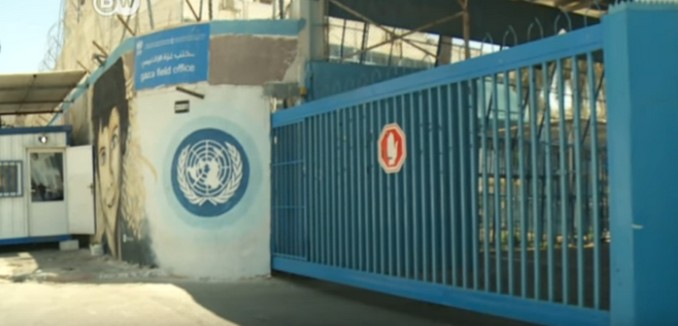The decisions by President Donald Trump to have the United States stop funding United Nations Relief and Works Agency (UNRWA), which aids those defined as Palestinian refugees, as well as cut funding to the Palestinian Authority (PA) has prompted criticism and predictions of disaster.
A recent Washington Post editorial asserted that UNRWA’s aid cut-off risked “worsening an already terrible humanitarian situation in Gaza, with unpredictable consequences.”
Trump, on the other hand, argued in a pre-Rosh Hashanah call with Jewish leaders that the reduction or elimination of aid would provide an incentive for the Palestinians to negotiate with Israel.
“I stopped massive amounts of money that we were paying to the Palestinians and the Palestinian leaders,” Trump said. He continued, “I’d say, you’ll get money, but we’re not paying you until we make a deal. If we don’t make a deal, we’re not paying.”
Trump’s policy questions past assumptions about Israeli-Palestinian peacemaking on a couple of fronts.
The question of aid to the Palestinians is not a new one, and the past shows that even generous aid doesn’t necessarily help most Palestinians.
In December 1998, the late columnist Michael Kelly observed that after four years of massive international aid, many Palestinians were still languishing in poverty:
Since July 1, 1994, the day that Yasser Arafat arrived to take charge of Gaza, the international community has given the Palestinian Authority about $2.5 billion in aid. In that time, to the confoundment of confident predictions, life in Gaza became, for most people, even more poor, nasty, brutish and short than it had been before the arrival of President Arafat.
As to why the billions in foreign aid hadn’t alleviated Palestinian misery, Kelly wrote, “President Arafat has established in Gaza and the West Bank a nasty, thuggish little kleptocracy run by and for the benefit of President Arafat and his bureaucrats and gunsels and cronies, without benefit of law or semblance of order.”
Arafat died in 2004, but his successors — Mahmoud Abbas and the Palestinian Authority in the West Bank, Ismail Haniyeh and Hamas in Gaza — have continued this tradition of enriching themselves and their families at the expense of their constituents.
Abbas has reportedly used his international connections not to create a functioning democracy in the West Bank, but to further the business ambitions of his sons. He also has been accused of misappropriating more than $100 million in aid money.
Haniyeh, according to an investigative report, is a multi-millionaire.
If the Palestinian leadership, the way it is currently constituted, provides its top officials with fabulous wealth, what incentive do they have to change? The lack diplomatic progress preserves their status.
Because of corruption in the ranks of their leaders, aid to the Palestinians has become more of an obstacle than an incentive for peace.
In addition to reducing direct aid to the PA, the United States has also cut all funding to UNRWA, after it failed to reform. While UNRWA is typically described as an aid agency, it is more than that. UNRWA, unlike the United Nations High Commissioner for Refugees (UNHCR), doesn’t just aid refugees but defines them in a way that actually increases their number.
UNRWA states on its website that in addition to Palestinians displaced during Israel’s 1948 War of Independence, “the descendants of Palestine refugee males, including legally adopted children, are also eligible for registration.” UNHCR has no similar allowance that all descendants qualify as refugees. Thus UNRWA reports that though it started providing services for about 750,000 Palestinian refugees, it now counts 5 million refugees as eligible for its services.
In addition to its overly generous definition of refugee, Einat Wilf, a former member of Knesset, pointed out in a recent interview with The Israel Project that its bookkeeping fails to acknowledge when refugees should be removed from the rolls. For example, of the 5 million Palestinian refugees defined by UNRWA, 2.1 million live in the West Bank and Gaza. Shouldn’t they be counted as being repatriated? 2.2 million living in Jordan are citizens, and thus would not be counted as refugees in any other place in the world.
The only reason to perpetuate the refugee status of millions of Palestinians, Wilf argued, is to keep alive in their minds that where they are residing is a temporary home, and the hope that they will be able to return to what is now Israel.
International financial aid, by cultivating a corrupt leadership and keeping Palestinians as refugees, has perpetuated Palestinian misery.
In his phone call, Trump defended his decision to cut direct and indirect aid to the Palestinians saying that he asked previous negotiators, “Did you ever do that before? Did you ever use the money angle?” He says that he was answered that doing so would be disrespectful. But Trump countered, “I don’t think it’s disrespectful at all. I think it’s disrespectful when people don’t come to the table.”
Trump appears determined to impose responsibility for making peace on the Palestinians. Maybe that is necessary to change the past dynamic of failure.
[Photo: DW English / YouTube ]




